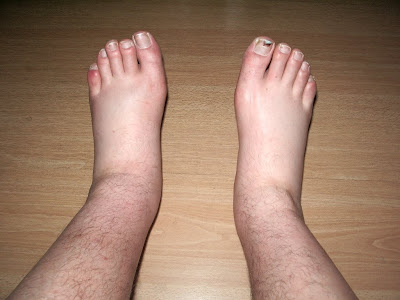 Once again, a new diet craze is sweeping through the rich and famous.
Once again, a new diet craze is sweeping through the rich and famous.In a gory reversal of medical best practice, a huge parasitical worm normally removed when found in humans, is being deliberately introduced into the bodies of desperate dieters as a way to reduce the number of digested calories.
It seems the lengths to which people will go for the perfect figure knows no limit.
The man behind the new technique is Dr Gustaf Glockenspiel, Head of Dieting Technologies at the University of Diet Science in Latvia, Europe.
In his new book, Beat the Tape Measure with the Tape Worm, he describes how he has been introducing tapeworms into the intestines of clients from his Latvian clinic for nearly 2 years, with a 100% success rate.
"Not one of my clients has ever come back," he proudly claims.
Fully grown tapeworms can reach 10 metres in length, and once ensconced in the human intestine can consume thousands of calories per day.
"It's the perfect solution," gushed Ami Stardust, a 23-year-old glamour actress from Estonia, who intends to have the treatment as soon as she has raised the money. "With this, I would be able to eat one extra slice of cheesecake each day without affecting my figure. I might even have two worms so I can have two slices."
Indeed, introducing more than one tape worm is not something Dr Glockenspiel rules out.
"Our bodies are full of parasites," he explains. "In years gone by, we'd all have one or more tape worms as a natural part of our internal ecosystem. I firmly believe that the obesity epidemic is a result of the elimination of tape worms from our bodies. Bringing back the tapeworm could be the answer we have been looking for."

Crowe - jerky
"These are not just any tape worms," he says. "It takes many months of training to ensure they eat the right foods."
"A regular tapeworm would eat anything that came into your stomach - or worse, it might eat the wrong things. If your tapeworm liked fruit and veg, you'd end up vitamin deficient."
"We train our tapeworms to eat only the things that are bad for humans, like chocolate and cake. This way, you are actually making your diet more balanced by having the tapeworm, as well as cutting calories."
"We use electric shock treatment to punish the trainee worms when they eat the wrong things, and when they eat the right things, they get extra helpings."
As Dr Glockenspiel's book rocketed to 13,456 on Amazon's bestseller list, experts were falling over themselves to criticise his work.

Jobs - at home
In the UK, Mr Peters' counterpart said "He doesn't sound like a very nice man - I would suggest his practices might be less than cricket."
A Hollywood rumour has it that actor Russell Crow is paying Dr Glockenspiel a seven-figure sum to train a tapeworm to eat only beef jerky, after the star developed a 25 packet-a-day habit on the set of the new Robin Hood movie.
Steve Jobs, who has nothing whatsoever to do with this story, was reputedly at his home in Palo Alto yesterday.
--------
Post Script
After writing this spoof post, I read this article, which suggests there may be people who really would go to these lengths to lose weight.
I then found www.tapeworm.net, the author of which offers a more evolutionary perspective, not far removed from the ideas I gave the fictional Dr Glockenspiel. They are selling their tapeworm product for $2,000.
Knowing there are few stones unturned in this area by Mark Sisson, I searched his site and found an entry about the tapeworm diet in his post about crazy diets.
Verdict: the truth is at least a strange as fiction.
Other Diet Stories:
The Hair Colour Diet
The Amputation Diet
'The Roman Box' Allows you Eat Without Digesting... Read more


















